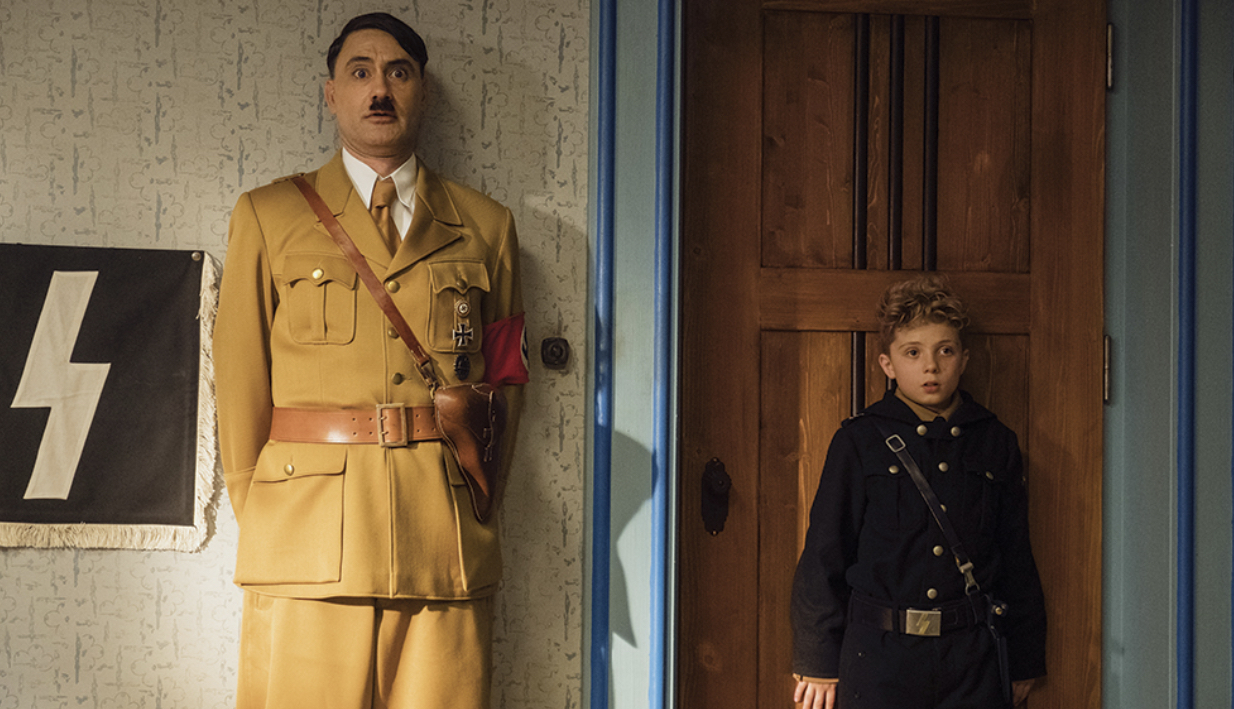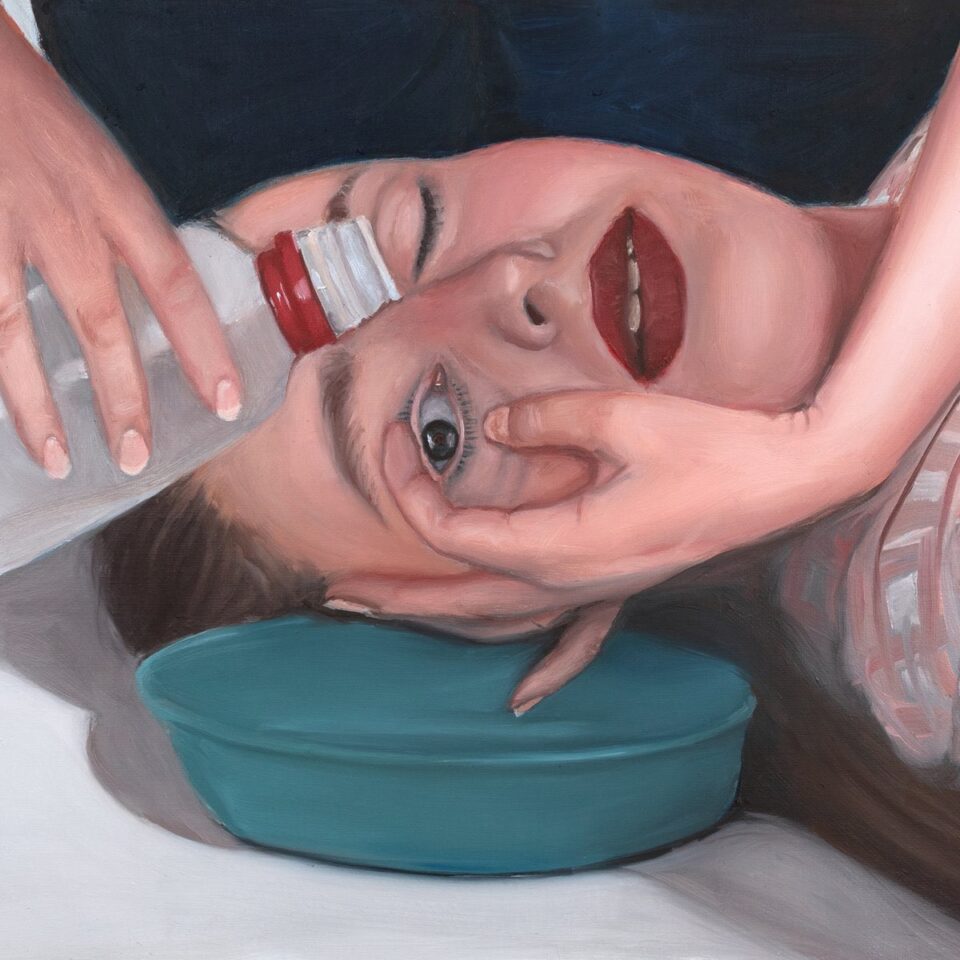Warning: This essay contains spoilers for Jojo Rabbit.
Jojo Rabbit, Taika Waititi’s adaptation of Christine Leunens’ Caging Skies, follows ten-year-old Johannes “Jojo” Betzler (Roman Griffin Davis) living in Germany during World War II. Indoctrinated through propaganda and biased teaching (“Jews love ugliness,” he says in one scene. “That’s another thing we learned in school.”), Jojo has accepted his place, but turns to an unusual friend for guidance: an imaginary Hitler, played by Waititi himself. Jojo Rabbit is billed as an “anti-hate satire” and is an extreme opposite to its solemn source material, but both aim to tell the same story of breaking free from normalization—of being met with something that challenges what you’ve been taught to such a degree that everything in your life changes.
The major difference between the novel and its adaptation, aside from the tonal change, is the presence of Waititi’s Hitler. Including the character was a risky choice, but he manages to portray the dictator with the perfect amount of idiocy and whimsy to both make fun of the historical figure and “play it for exactly what it is, which is a ten-year-old’s idea of an imaginary friend,” as Waititi told NPR. For Jojo, the imaginary Hitler serves as more than just a representation of his inner voice; the figure is also a visual representation of his normalization of the world around him. By placing a child at the center of the story, Jojo Rabbit gives us permission to laugh through discomfort, because the film’s goal is clear: to show us the often-unfortunate result of accepting what we’re told is right without question.
We meet Jojo in the first scene of the film as he nervously prepares to join the Jungvolk, a faction of the Hitler Youth. “It’s going to be intense, but today you become a man,” he tells his reflection. “Now, Heil me, man!” Waititi’s Hitler replies, appearing on-screen. The film makes it clear that Jojo has no second thoughts about his beliefs. He’s a follower, and he won’t change easily.
Where Jojo Rabbit excels is in treating the audience as an extension of Jojo, seeking to make them just as uncomfortable as the boy. Waititi achieves this through tonal shifts, which work in the story’s favor by keeping viewers on their toes rather than harshing the comedy vibe. In one of the film’s more jarring moments, Jojo is hanging up Nazi propaganda in the streets when he comes across his mother, Rosie (Scarlett Johansson), in the town square. Her gaze is fixed on something just out of Jojo’s view, and as we collectively turn to see what she’s looking at, we find ourselves facing bodies hanging from gallows. After a moment, Jojo turns away with a quiet “yuck,” but Johannsen’s character physically turns his head back to face the bodies. “Look,” she says. Before he has time to thoughtfully process what he’s seeing, he returns to the thoughtless fake reality he’s constructed.
By pulling back the comedic curtain to reveal the film’s reality, Waititi reminds us that this is not a soulless Hitler romp but a solid satire. In a meta twist, we normalize Jojo Rabbit in the same way Jojo normalizes Nazi ideology. Unlike Jojo, however, Waititi does not allow us the convenience of ignoring reality.
The major turning point for Jojo is when he discovers that his mother is hiding a teenage Jewish girl, Elsa, in their wall. Jojo and Elsa begin to spend time together and form a bond, but Jojo remains certain of the beliefs he’s had drilled into his brain. He doesn’t question the outlandish, intimidating things that Elsa tells him about her people; it doesn’t sound wrong when she says that Jews are blood-eaters, horn-havers, and mind-readers. It isn’t until Jojo has a personal stake in the issue that he fully begins to reckon with the reality. “Here’s the situation: If I tell on you, you’ll be in big trouble, and I don’t think you want that,” Jojo says to Elsa. “But then you’ll tell on me and my mother, and we’ll be in trouble, which I don’t want. And if you tell my mother I know, then she’ll kick you out, which you don’t want. And if I tell my mother I know, then you’ll cut off my Nazi head, which I also don’t want.”
Jojo describes the situation with confidence, but it’s misplaced. He’s so close to wrapping his head around the state of affairs, to understanding not just his current situation but his current place in the world. Normalizing terror is a tricky thing, because it becomes less about the actual atrocities being committed and more about peddling the dangerous lies that fortify them. And when you can’t see the consequences, it’s easier to convince yourself they’re normal and justified.
Normalizing terror is a tricky thing, because it becomes less about the actual atrocities being committed and more about peddling the dangerous lies that fortify them. And when you can’t see the consequences, it’s easier to convince yourself they’re normal and justified.
As the two spend more time together, Jojo does begin to question his beliefs more frequently, which in turn affects his relationship with Waititi’s Hitler. The more Jojo pushes back against what he’s been taught, the more the two disagree; the imaginary Hitler doesn’t take his defect in loyalty lightly. As Jojo’s worldview begins to crumble, the Hitler character becomes less funny and more realistic—another peek at reality. When Jojo finally breaks through his internalized indoctrination, Waititi’s Hitler snaps. “Germany depends on the passion of these young men, passion and a readiness to fall for the fatherland, despite the futile efforts of Allied war profiteers who send their ill-prepared armies clumsily into the lair of the wolf,” he spews with a biting anger reminiscent of the fascist’s real speeches. “And only zealous men who stand steadfast in the face of the enemy will be etched in German memory forever. But it is up to you to decide if you want to be remembered or disappear without a trace like a grain of sand into the desert of insignificance!”
Then suddenly, everything is dark. The sky is cloudy. The posters Jojo so dutifully put up in the beginning of the film are suddenly falling apart, and as much as he tries to hold them up, they won’t stay. Jojo follows a butterfly but stops abruptly as he once again comes across the gallows and finds his own mother hanging there. This time, Jojo does not look away. He looks at the horror head-on, unwilling to accept the truth, unwilling to ignore it.
Once he finally removes himself from his mother’s side, Jojo goes home, and we see him encroaching on Elsa with a knife in his hand. Right before the act, though, Jojo changes his mind. He’s confused, trying to process everything he’s learned. Elsa doesn’t deserve to die; she’s not a bad person. And Jojo’s mother didn’t die because of Elsa; her own activism doomed her. It’s the singular moment of realization for Jojo. He drops the knife and drops to his knees, exhausted.
Jojo Rabbit ultimately succeeds as a satire because it asks us to step back from our normal world and take a real look at it. Regardless of age or perceived clarity, none of us are immune to propaganda and indoctrination, and to allow such teachings to become normal is dangerous. By setting his story in World War II Germany, Waititi makes it easy to see what’s right and wrong. For Jojo, however, it’s just the world he’s growing up in; it’s hard to remove yourself from everyday societal pressures.
The movie earns its categorization as an “anti-hate satire” because it doesn’t ask for us to look at the harm that comes from normalizing brutality, arrogance, and hate—it demands that we do. It slowly shatters a relatable young character’s worldview in an effort to show why we must take responsibility—lest we face being on the wrong side of history. FL







